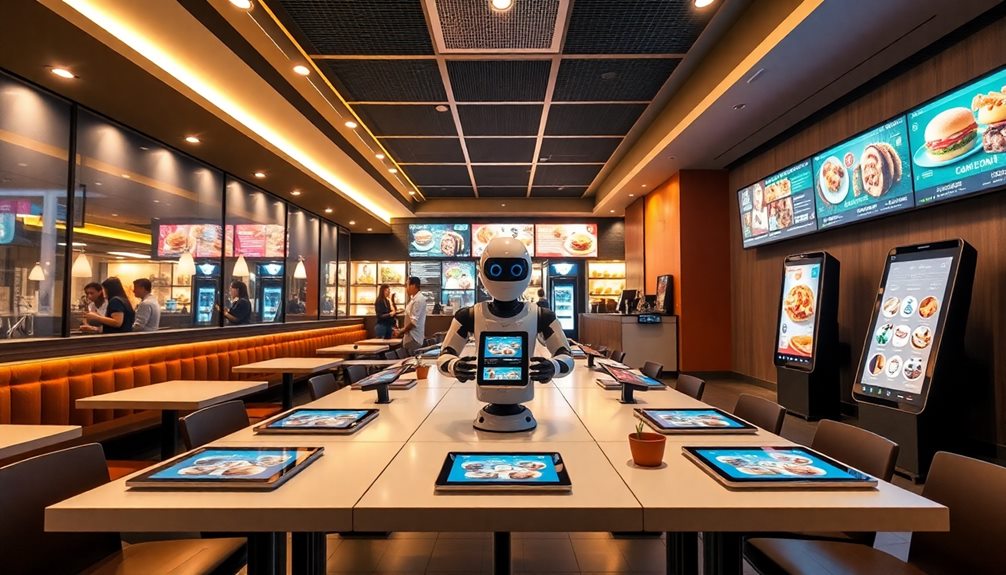Sustainable restaurant practices prioritize eco-friendliness and community well-being. You can enjoy meals made from local, seasonal ingredients that minimize environmental impact while supporting nearby farmers. Restaurants often use energy-efficient appliances to cut costs and reduce waste. By adopting composting and recycling techniques, they considerably decrease food waste. You'll also notice eco-friendly packaging that reduces single-use plastics, aligning with diners' values. Many establishments actively engage with their communities, offering food donations and leading sustainability workshops. Embracing these practices not only elevates your dining experience but also fosters a healthier planet. So, keep exploring to discover even more about these initiatives.
Key Takeaways
- Implementing local and seasonal food sourcing reduces transportation emissions and supports local economies.
- Adopting energy-efficient appliances can save significant operational costs and reduce environmental impact.
- Utilizing biodegradable packaging and reducing single-use plastics align with consumer preferences and minimize landfill waste.
- Engaging in community initiatives, like food donations and sustainability workshops, strengthens local ties and promotes eco-friendly practices.
- Regular waste audits and composting programs help identify improvements in waste management and enhance sustainability efforts.
Understanding Restaurant Sustainability
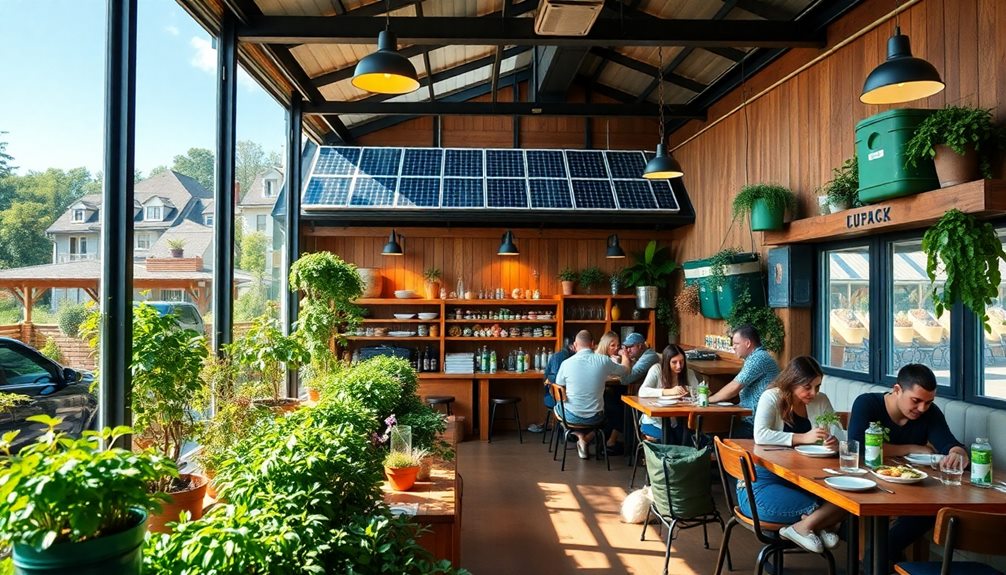
Understanding restaurant sustainability is vital for today's dining landscape. It involves adopting practices that minimize your establishment's environmental impact while enhancing your operations.
By focusing on energy efficiency, you can reduce your carbon footprint and save on utility bills—some restaurants save up to $5,300 annually with energy-efficient appliances. Conducting a thorough energy efficiency evaluation can help identify areas for improvement, leading to even greater savings.
Local sourcing plays an important role in sustainability. When you buy ingredients from nearby farms, you not only support the local economy but also cut down on transportation emissions, ensuring fresher meals for your customers.
Additionally, implementing strategies to reduce food waste, like composting and recycling, can greatly lessen your contributions to landfills, promoting a circular economy.
Eco-conscious diners increasingly prefer sustainable options, with 83% expressing a desire for environmentally friendly dining experiences. By adopting these practices, you not only attract a loyal clientele but also contribute positively to the environment.
The cost savings achieved through energy efficiency and waste reduction can bolster your bottom line, making sustainability not just a trend, but a smart business strategy.
Embracing these sustainable practices isn't just good for the planet; it's also good for your restaurant's reputation and profitability.
Sustainable Food Sourcing

As consumers become more eco-conscious, sustainable food sourcing has emerged as an essential factor for restaurants aiming to minimize their environmental impact.
By prioritizing practices that align with these values, you can create a more responsible dining experience. Here are three key strategies for effective sustainable food sourcing:
- Use Local Ingredients: Sourcing ingredients locally can greatly reduce transportation emissions, leading to a smaller carbon footprint. Supporting local farmers not only boosts the local economy but also enhances the freshness and quality of your menu items.
- Prioritize Seasonal Produce: Focusing on seasonal produce minimizes energy use for transportation and storage. This approach not only promotes sustainability but also offers guests the best flavors available at any given time.
- Engage in Sustainable Seafood Sourcing: Choosing suppliers who adhere to environmentally friendly fishing practices helps protect marine ecosystems.
This commitment addresses concerns over overfishing and habitat destruction, ensuring a healthier future for our oceans.
Energy Efficiency Strategies
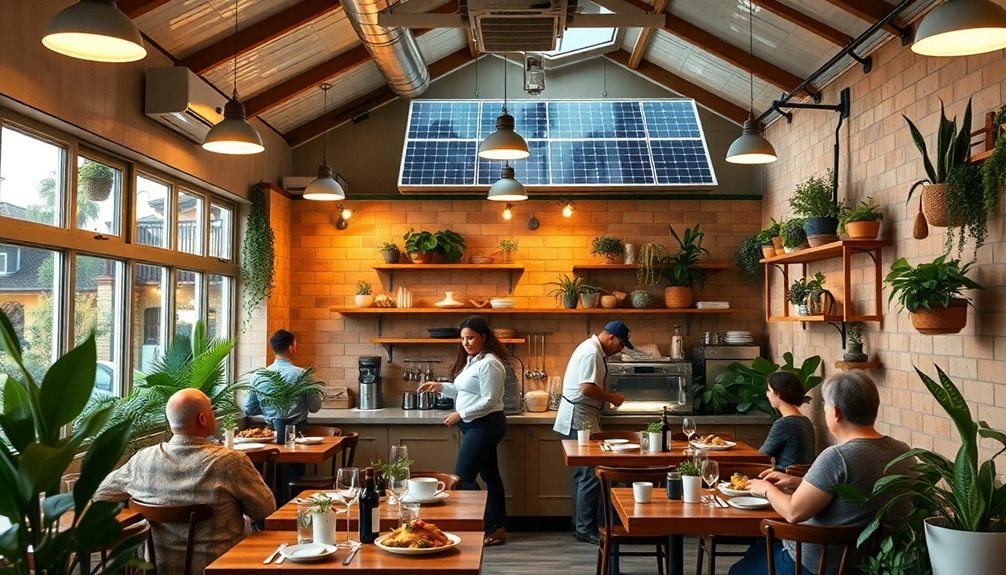
Energy efficiency is essential for modern restaurants looking to cut costs and reduce their environmental impact. By investing in energy-efficient appliances, particularly those certified by ENERGY STAR, you can save up to $5,300 annually in utility costs due to lower energy consumption.
Implementing smart thermostats and motion sensor lighting also helps reduce energy usage by adjusting settings based on occupancy, leading to significant savings.
Regular maintenance of your HVAC systems not only enhances efficiency but can also lower energy consumption by up to 30%. This contributes to reduced operational costs and a healthier environment.
Additionally, switching to LED lighting, which uses about 75% less energy than traditional incandescent bulbs, can lead to substantial reductions in your electricity bills.
To optimize your energy consumption further, consider conducting energy audits. These audits help you identify areas for improvement, allowing you to implement strategies that effectively reduce energy waste and your carbon footprint.
Waste Reduction Techniques
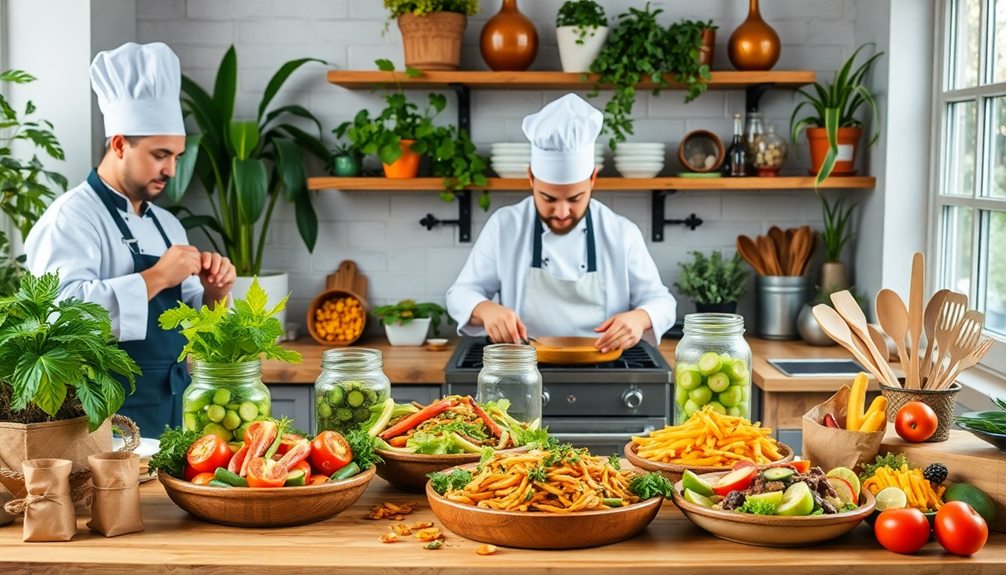
Cutting down on waste is an essential step for restaurants aiming to enhance sustainability and boost their bottom line. By implementing effective waste reduction techniques, you can greatly lower food waste and reduce your carbon footprint.
For instance, using best dishwasher cleaners can guarantee that kitchen equipment operates efficiently, reducing energy waste. Here are three strategies to take into account:
- Inventory Management Software: Optimize stock levels to minimize overbuying. This can prevent the loss of approximately $25 billion annually to food waste in the industry.
- Composting Organic Waste: Divert food scraps from landfills and enrich soil. This not only promotes sustainability in restaurants but also supports community composting initiatives.
- Eco-Friendly Takeout Packaging: Use biodegradable or compostable materials instead of single-use plastics. This aligns with growing consumer demand for sustainable dining options.
Additionally, conducting food waste audits can help you identify areas for improvement in portion sizes and creatively repurpose leftovers.
Don't forget to participate in local recycling programs and place recycling bins throughout your restaurant to educate staff on proper waste sorting.
Community Engagement Initiatives
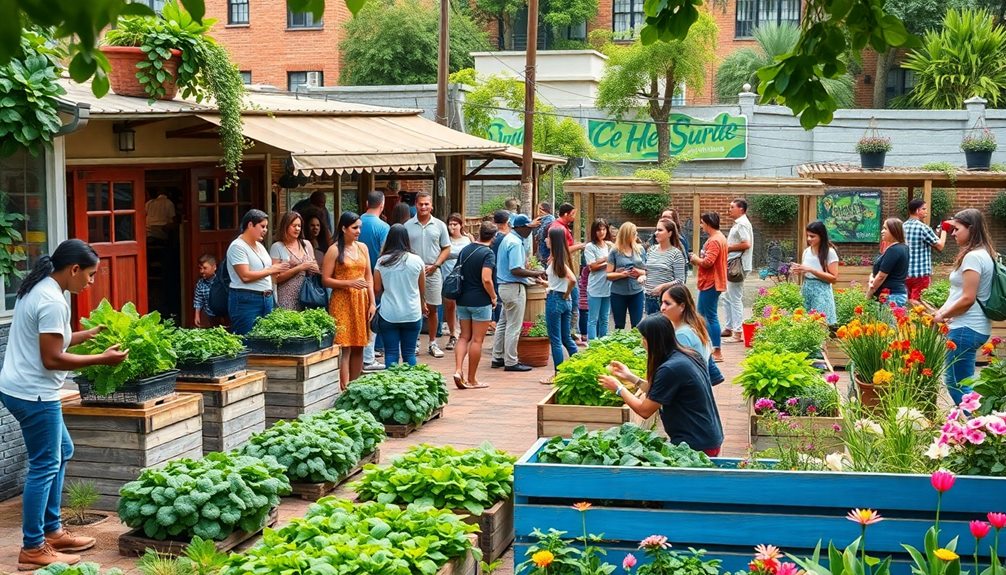
When you engage your restaurant in community initiatives, you're not just enhancing your reputation; you're building trust with your customers.
Partnering with local organizations for sustainability events or hosting workshops can greatly boost community participation and awareness.
Plus, by participating in eco-friendly campaigns, you create a positive impact that resonates with your diners.
Local Partnerships and Collaborations
Building strong local partnerships is essential for restaurants aiming to enhance their sustainability efforts and community impact. By collaborating with local farmers and producers, you not only support your community but also reduce transportation emissions.
Local sourcing can cut carbon footprints by an average of 25% compared to imported goods, and restaurants can also benefit from Louisiana alimony laws when evaluating financial commitments during challenging times.
Here are three key ways to strengthen these partnerships:
- Food Donations: Partner with local charities to donate edible food. This can greatly minimize food waste, addressing the staggering 72 billion pounds of edible food wasted annually in the U.S.
- Community Events: Engage in local food festivals and markets. These events promote your sustainable offerings and strengthen the local economy, generating twice the economic impact for every dollar spent on local food systems.
- Environmental Organizations: Establish ties with local environmental groups. This collaboration can provide expertise and resources that foster a culture of sustainability, attracting eco-conscious diners and boosting community involvement.
Sustainability Workshops and Events
Engaging your community through sustainability workshops and events can greatly enhance your restaurant's eco-friendly mission. Hosting these workshops not only educates your staff and customers on eco-friendly practices but also aligns with the 83% of consumers who seek environmentally friendly dining options. You'll foster stronger relationships with local organizations, opening doors for partnerships that elevate your sustainability efforts.
Here's a quick overview of potential workshop topics:
| Workshop Topic | Benefits |
|---|---|
| Waste Reduction Strategies | Decrease waste and save costs |
| Local Sourcing Benefits | Support local farmers and reduce carbon footprint |
| Energy Efficiency Practices | Lower utility bills and reduce emissions |
Involving customers in community events, like tree planting or clean-up drives, strengthens community ties and showcases your commitment to environmental responsibility. Regularly hosting these sustainability events not only raises awareness but also positions your restaurant as a leader in eco-friendly practices, attracting customers who prioritize sustainable dining. By taking these steps, you'll make a meaningful impact on both your community and the environment.
Eco-Friendly Campaign Participation
Participating in local eco-friendly campaigns can greatly boost your restaurant's profile and connect you with like-minded individuals in the community. By engaging in these initiatives, you not only enhance your visibility but also demonstrate a commitment to social responsibility and environmental values.
Here are three impactful ways to get involved:
- Join Community Sustainability Initiatives: Collaborate on projects like tree planting or recycling drives. This fosters strong relationships with local organizations and residents, while also promoting restaurant sustainability practices.
- Implement Food Donation Programs: Partner with local shelters to donate excess food. This helps reduce food waste and strengthens community ties, showing customers you care about social contributions.
- Host Workshops on Sustainable Practices: Educate your team and customers about using eco-friendly cleaning products and biodegradable packaging. This builds awareness and encourages participation in eco-friendly initiatives, ultimately helping to reduce carbon emissions.
Eco-Friendly Packaging Solutions
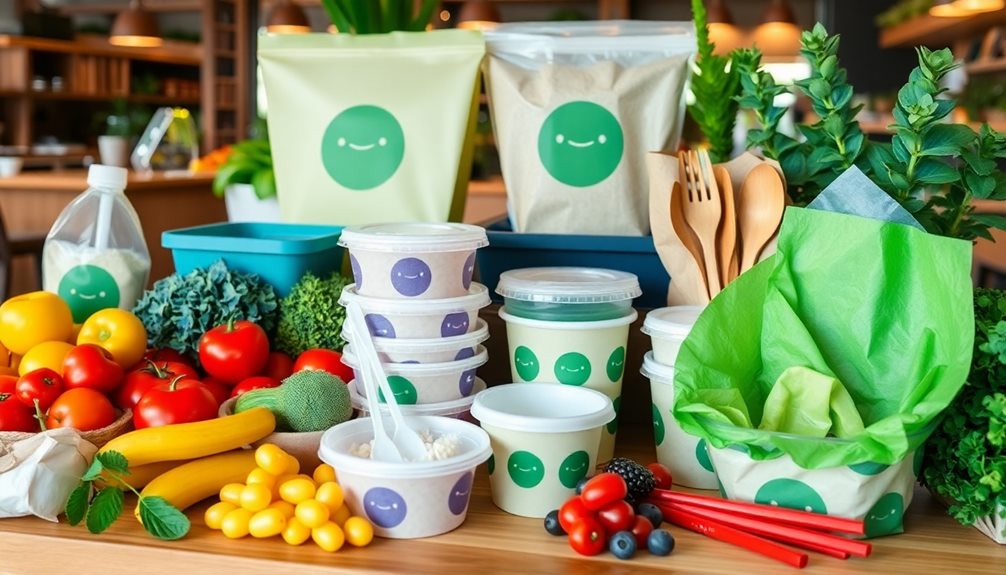
When it comes to eco-friendly packaging, switching to biodegradable options helps reduce single-use plastics that harm the environment.
You'll not only attract customers who prioritize sustainability, but you'll also contribute to a cleaner planet.
Let's explore how these innovative solutions can transform your restaurant's impact.
Biodegradable Packaging Options
As more restaurants recognize the importance of sustainability, many are turning to biodegradable packaging options to reduce their environmental impact. By adopting these solutions, you can considerably lower your carbon footprint and attract environmentally conscious customers.
Here are three key benefits of using biodegradable packaging:
- Reduce Waste: Biodegradable materials, like those made from cornstarch and sugarcane, decompose within 90 to 180 days, considerably reducing landfill waste compared to traditional plastics.
- Consumer Preferences: Nearly 49% of diners prioritize biodegradable or recyclable packaging when choosing where to eat. By aligning with these preferences, you can enhance your restaurant's appeal.
- Reduce Dependence: Making the switch to biodegradable packaging helps reduce dependence on single-use plastics, which contribute to the 8 million metric tons of plastic waste entering our oceans each year.
Implementing biodegradable packaging not only supports restaurant sustainability but can also boost customer loyalty.
With 83% of consumers enthusiastic for environmentally friendly dining options, you'll likely see a positive response from your patrons, encouraging them to return and support your eco-friendly initiatives.
Reducing Single-Use Plastics
Beyond biodegradable packaging, reducing single-use plastics is an essential step for restaurants aiming to enhance their sustainability efforts. Every year, the restaurant industry contributes considerably to environmental pollution, with an estimated 300 million tons of plastic produced globally, much of which ends up in landfills and oceans.
By embracing eco-friendly packaging solutions like compostable materials and reusable packaging, you can drastically cut down on your environmental impact.
Switching to biodegradable packaging not only fosters a more sustainable restaurant image but also resonates with your customers. A survey shows that 49% of consumers prefer dining at establishments that offer biodegradable or recyclable packaging.
Implementing reusable options, such as glass or stainless-steel containers, not only minimizes waste but also boosts customer satisfaction and loyalty by showcasing your commitment to sustainability.
Additionally, changing to these eco-friendly packaging solutions can lead to considerable cost savings. By effectively recycling and composting, you could potentially reduce waste disposal costs by up to 30%.
Frequently Asked Questions
How Can a Restaurant Practice Sustainability?
You can practice sustainability by implementing energy-efficient appliances, sourcing local ingredients, reducing waste, using eco-friendly packaging, and training your staff. These steps not only lower costs but also enhance your restaurant's reputation among environmentally conscious consumers.
What Is a Sustainable Food Practice?
A sustainable food practice's like discovering a treasure chest! It involves sourcing local, seasonal ingredients, reducing waste, and opting for eco-friendly packaging. You'll not only delight your taste buds but also help the planet thrive.
What Does Sustainability Mean in a Restaurant?
Sustainability in a restaurant means you're using methods that reduce environmental impact. You focus on eco-friendly practices, support local economies, and prioritize healthier options, all while appealing to customers who care about the planet.
How Can We Practice Sustainability in Food Industry?
You can transform the food industry into a green powerhouse! Start by sourcing locally, using energy-efficient appliances, reducing waste, and training your team on eco-friendly practices. Every small step makes a monumental difference for our planet!
Conclusion
By embracing sustainable restaurant practices, you're not just serving meals; you're nurturing the planet, much like a gardener tending to their crops. From sourcing food responsibly to minimizing waste, every action you take contributes to a healthier environment. Remember, even small changes can create a ripple effect—think of it as the butterfly effect. So, let your restaurant be a beacon of sustainability, inspiring others to follow suit and cultivate a greener future for all.



